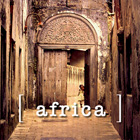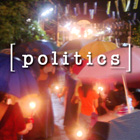
|
|||||||
Photo credit for "Africa" graphic, above: © 2005 Jennifer Lewis
|
RISK OF RETURN TO CIVIL WAR IN D.R. CONGO
CHALLENGER BEMBA REFUSES TO ACCEPT LEGITIMACY OF COUNT, UN FORCES SURROUND HIS HOME IN EFFORT TO PREVENT RETURN TO WAR 15 November 2006 Reports suggest there is a new risk of civil war in the Democratic Republic of Congo, after the opposition party leader announced he rejects the election results that returned the presidency to Joseph Kabila. The Roman Catholic archibishop of Kinshasa, Cardinal Frédéric Etsou, also denounced the election result as a rigged vote designed to deliver Congo's mineral wealth to western powers, telling Radio France International "results that are coming out are not the results that are being published". According to the Guardian newspaper, "Tensions in the city are high after fighting by supporters of the two candidates using mortars and Kalashnikov rifles left four dead on Saturday. Clashes killed 23 in the city in August after the first round of elections." Concerns about mounting interfactional violence put the state on alert for possible descent into conflict during or after the polling process, and Pres. Joseph Kabila announced he would support the outcome of the first free and open elections since independence. The situation for Mr. Bemba has been more problematic. His history as a warlord and leader of the rebel movement, during years of civil war and afterward in conflict with the Kabila government, means his campaign was a constant reference to the armed groups that still give him power in Congo's political life. Support for Kabila or for Bemba has been sharply divisive, often along ethnic or socioeconomic lines. Official sources in Kinshasa have told the press that Mr. Kabila has offered Mr. Bemba the post of prime minister, in order to form a government capable of overcoming generations of armed conflict, but that Bemba refused. "Allies" of Mr. Bemba are reportedly "urging him to turn to armed resistance because they believe his overwhelming popular support in Kinshasa means he could seize control of the city and large parts of the east and north of the country." Highlighting the factional strife latent in the current political environment, Cardinal Etsou has been quoted as saying "I ask the international community to abstain from all attempts to impose on the people of Congo he whom they have not chosen as their president ... just to satisfy gluttonous and predatory appetites like those of a foreign dictator". Mr. Bemba has reported his complaints about vote blocking to the electoral commission and has said his personal helicopter was destroyed by government forces and his television station was closed by the government, in an effort to prevent him from competing fairly in the national campaign. Along with 17,500 "blue helmet" UN peacekeepers serving in DR Congo (the largest deployment in the world at present), the UN has stationed an additional 1,400 peacekeepers in Kinshasa in an effort to halt any slide toward armed conflict. UN troops have reportedly surrounded Bemba's private compound in Kinshasa. [s]
D.R. CONGO VOTES IN FIRST FREE ELECTIONS IN 40 YEARS The Democratic Republic of Congo voted Sunday in its first free and decisive presidential elections in four decades. It is hoped that a peaceful transition with a recognized, elected government, will bring peace to the war-ravaged country. More than four million people have been killed in civil war, just since 1998, and decades of instability and violent conflict have taken many more lives. [Full Story] AMNESTY REPORTS INTERNATIONAL ARMS TRADE 'OUT OF CONTROL' Amnesty International has published a new report examining the international arms trade, and its findings indicate there is little control on the expanding web of private interests seeking to profit from a proliferation of dangerous weapons. The report also illustrates the ways in which this scattering of dangerous weapons has lead to severe human rights abuses. [Full Story] 4 MILLION KILLED IN DEMOCRATIC REPUBLIC OF CONGO SINCE 1998 Ongoing armed conflict in the Democratic Republic of Congo —formerly Zaire— has taken an estimated 4 million lives since 1998. While the brutal civil war that began in 1998 took an estimated 2 million lives, continued factional conflict, disease, lack of basic civil social services and malnutrition, due in part to crop failure, have combined to take another 2 million lives. [Full Story] CONGOLESE CHILD SOLDIERS DISARMED The UN reports that over 400 child soldiers were "demobilized" in the Eastern Congo, a region still plagued by instability and deprivation. The child rebels were offered humanitarian and food aid in exchange for their weapons, setting what might be an example for other such missions in war-torn, remote regions. [Full Story]
|
||||||
|
|||||||

